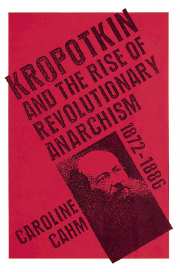Book contents
- Frontmatter
- Contents
- Preface
- Acknowledgements
- Introduction
- Part I Kropotkin and the development of the theory of anarchist communism
- Part II Kropotkin and the development of anarchist ideas of revolutionary action by individuals and small groups (1872–1886)
- 3 Revolutionary action and the emergent anarchist movement of the seventies
- 4 Propaganda by deed: the development of the idea
- 5 Kropotkin and propaganda by deed
- 6 Kropotkin and acts of revolt
- 7 The Congress of London 1881 and ‘The Spirit of Revolt’
- 8 The trial of Lyon 1883 and response to persecution
- Part III Kropotkin and the development of anarchist views of collective revolutionary action (1872–1886)
- Conclusion
- Notes
- Bibliography
- Index
5 - Kropotkin and propaganda by deed
Published online by Cambridge University Press: 14 September 2009
- Frontmatter
- Contents
- Preface
- Acknowledgements
- Introduction
- Part I Kropotkin and the development of the theory of anarchist communism
- Part II Kropotkin and the development of anarchist ideas of revolutionary action by individuals and small groups (1872–1886)
- 3 Revolutionary action and the emergent anarchist movement of the seventies
- 4 Propaganda by deed: the development of the idea
- 5 Kropotkin and propaganda by deed
- 6 Kropotkin and acts of revolt
- 7 The Congress of London 1881 and ‘The Spirit of Revolt’
- 8 The trial of Lyon 1883 and response to persecution
- Part III Kropotkin and the development of anarchist views of collective revolutionary action (1872–1886)
- Conclusion
- Notes
- Bibliography
- Index
Summary
Kropotkin never liked the slogan propaganda by deed, and did not use it to describe his own ideas of revolutionary action, for, in his view, the deeds of revolutionaries had to be serious and sincere acts of revolt if they were to achieve anything at all. Nevertheless from the very beginning of his revolutionary career, he was just as preoccupied as other bakuninists and anarchists with the necessity of revolutionary action in addition to oral and written propaganda, and he certainly supported the forms of action adopted by the early advocates of propaganda by deed.
Kropotkin's first attempt to outline a policy of revolutionary action appeared in the proposed manifesto he drew up for the Chaikovsky Circle in 1873. By the time he had joined the circle in May 1872 on his return from Switzerland the group was already involved in the production and distribution of illegal socialist literature (Knizhnoe delo – the cause of the book) and had begun to engage in oral propaganda among the workers of St Petersburg (Rabochee delo – the cause of the workers). Kropotkin had taken part in the Knizhnoe delo to the extent of writing the concluding section to Tikhomirov's pamphlet on Pugachev), but his principal and most successful contribution to the work of the group was the role he had played in developing propaganda activity among the workers in the Moscow and St Petersburg factories which began at the end of 1872.
- Type
- Chapter
- Information
- KropotkinAnd the Rise of Revolutionary Anarchism, 1872-1886, pp. 92 - 115Publisher: Cambridge University PressPrint publication year: 1989
- 1
- Cited by

